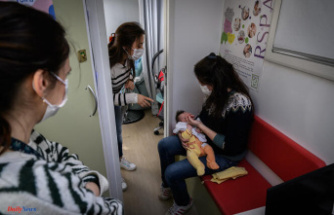Only six days after the gas supply from Russia was resumed through the Nord Stream 1 pipeline, the supply volume is to be halved. The Russian company Gazprom wants to reduce the gas volume this Wednesday from 40 percent to 20 percent of maximum capacity. The company announced on Monday that only 33 million cubic meters of gas would flow through the main supply line to Germany every day. The reason was the repair of another turbine, it said. Federal Minister of Economics Robert Habeck (Greens) sharply criticized Kremlin boss Vladimir Putin.
Last week, Putin threatened that there could be a further cut in gas supplies via Nord Stream 1 around July 26. He had referred to turbines used by the Russian energy company.
According to this, a throttling is possible if a turbine repaired in Canada is not available again in time. In addition, the repair of "another unit" would be necessary, said Putin at the time.
"Putin is playing a perfidious game," Habeck told the DPA news agency. His strategy is transparent. "He's trying to weaken the great support for Ukraine and drive a wedge in our society. To do this, he's fueling uncertainty and driving up prices. We're countering this with unity and concentrated action."
Gas deliveries via the currently most important connection to Germany for Russian natural gas were only resumed on Thursday after a ten-day routine maintenance. As early as June, Gazprom had reduced deliveries via the pipeline to 40 percent of maximum capacity and referred to a turbine that had been sent to Canada for repairs.
Siemens Energy's turbine was initially stuck in Canada because of Western sanctions following Russia's war of aggression against Ukraine. She is now on her way back from Canada via Germany to Russia. It was unclear exactly where she was last.
"There are no technical reasons for the delivery cuts," said Habeck. "The turbine is ready for delivery to Russia." Siemens Energy's export documents are complete, but Russia refuses to issue the import documents. "Russia breaks treaties and blames others."
A spokesman for Siemens Energy said the transport of the turbine was prepared and could start immediately. "Siemens Energy had already received all the necessary documents for the export from Germany to Russia at the beginning of last week and also informed Gazprom about this. What is missing, however, are the necessary customs documents for the import to Russia. This information can only be provided by the customer." The maintenance of the turbines is and will remain a routine process. "There have been no major complications in the last ten years."
The Canadian government's current approval also provides for additional Siemens Energy turbines to be serviced in Montreal and then exported, the spokesman said. The company therefore currently sees no connection between the turbine and the gas throttling that has been carried out or announced.
European stock exchange trading reacted immediately to the announcement of lower delivery volumes from Russia. The natural gas price went up. The futures contract TTF on the energy exchange in the Netherlands, which is regarded as trend-setting, was traded at up to 175 euros per megawatt hour. That is an increase of 7.7 percent compared to Friday. The energy expert Florian Starck from the price portal Check24 expects gas prices on the stock exchanges to continue to rise. Because the demand for gas is relatively constant, and now a replacement must be found for the failure of Russian gas.
In the short term, the gas requirement in Germany is covered. It could get tight in the long run. The head of the Federal Network Agency, Klaus Müller, recently warned: "Even at a level of 40 percent, we have to make considerable efforts to get through the first winter well." If only 20 percent of the maximum capacity comes out of the pipeline, the procurement of a replacement becomes correspondingly more urgent. Filling up the gas tanks in particular could become a problem.
The federal government has set a storage level of at least 95 percent as a target for November 1st. That is unrealistic, even if 40 percent of the delivery capacity flows through the pipeline, Müller said on Monday at a crisis summit of the Baden-Württemberg state government. In the best case, a maximum of 80 to 85 percent is possible. If the gas supply is halved, this goal will also be difficult to achieve.
"We are taking precautions so that we can get through the winter," said Habeck. He announced a new energy security package last week. "From the construction of an LNG infrastructure at extremely high speed to filling the storage facilities and reducing consumption - we are working on this with all our might. It is clear: gas consumption must go down, the storage facilities must be filled. The federal government is doing something about it is always necessary."
The energy expert at the Chemical Industry Association, Jörg Rothermel, told the editorial network Germany: “The further reduction in gas deliveries to 20 percent increases the risk that we will lack gas in winter because we will have great difficulty filling our storage facilities.” Because it's an uncertainty "we have to live with at the moment. Nobody knows how the situation will develop." It is all the more important "that we implement the measures that will make us less dependent on Russian gas supplies as quickly as possible. These are floating LNG terminals, replacing gas-fired power generation with coal and the planned auction model."












